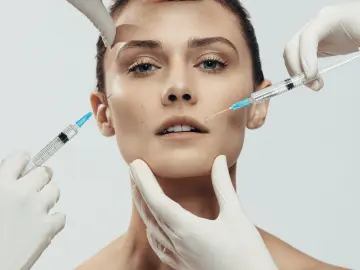Here at Save Face, we think that anybody considering having a non-surgical cosmetic procedure should be fully informed about treatments before they undergo them. Our focus is on providing factual and impartial information on non-surgical cosmetic procedures so that you can make an educated decision when it comes to choosing the right practitioner to carry out your treatment.
At Save Face we connect those looking to undergo non-surgical cosmetic procedures with medically qualified aesthetic practitioners who have met strict Save Face best practice standards. We send clinically experienced nurses to thoroughly assess every premise that we accredit, so you can rest assured that you’ll be in safe hands.
Whilst practitioners offering surgical procedures have to register with the Quality Care Commission, those who administer non-surgical procedures do not. That’s why we think it’s important that you know the difference.
Surgical Cosmetic Procedures
To be classed as surgical, a medical incision needs to be made in order to carry out the procedure, usually under local or general anaesthetic.
Examples of surgical cosmetic procedures are things such as breast augmentation, rhinoplasty and liposuction.
Surgeons offering surgical cosmetic procedures should be registered with the General Medical Council, and preferably be a member of the British Association of Plastic, Reconstructive and Aesthetic Surgeons (BAPRAS).
Non-Surgical Cosmetic Procedures
Non-surgical cosmetic procedures do not require a surgical incision to be made and are usually considered minimally invasive. However, as with any medical procedure, these treatments may have some side effects, especially if they’re carried out by practitioners who are not properly qualified. This is where Save Face comes in. As non-surgical cosmetic procedures aren’t currently regulated by law, we have developed a centralised register of Save Face accredited practitioners who have been thoroughly vetted to ensure that they uphold Save Face best practice standards.
Types of Non-Surgical Cosmetic Procedures
There are many types of non-surgical cosmetic procedures but some of the most popular treatments include:
Botulinum Toxin Injection
Those who are looking to turn back the clock or to prevent aging may opt for botulinum toxin (BOTOX®) injections. This treatment involves injecting the botulinum toxin directly into the muscle, which blocks signals from nerve cells, preventing muscles from contracting and smoothing out their appearance.
These injections can also be used for non-cosmetic reasons such as treating hyperhidrosis (excess sweating) or to lessen migraines.
Dermal Fillers
Dermal fillers are a multi-functioning treatment and can be used to reduce deep lines and wrinkles, fill hollows and smooth the contours, as well as adding or restoring volume to areas of the face such as lips or cheeks.
Chemical Peels
Chemical peels use chemicals to remove the outer layer of skin cells on the face, removing dead skin to reveal a new and fresh layer. These come in different strengths, categorised as ‘superficial’, ‘medium’ or ‘deep’.
Microdermabrasion
Microdermabrasion is a form of intensive exfoliation which uses fine crystals and a vacuum to remove dead skin cells, smoothing out the surface of the skin and improving its overall appearance.
Non-Surgical Laser Treatment (Laser Lipo and Laser Hair Removal)
Laser hair removal is the process of destroying the hair follicle by exposing it to repetitive pulses of laser light. This causes unwanted hair to fall out, and with frequent treatments will prevent it from re-growing.
Laser liposuction is a non-invasive treatment used to give people a slimmer appearance. Lasers are used to disrupt cell membranes so that they release fatty acids (triglycerides) into the body. These acids are then used as an energy source and burned up by the body.
Save Face
Whatever non-surgical cosmetic procedure you’re interested in, make sure you’re fully informed before you undergo treatment by reading the relevant Save Face factsheet. If you're still unsure, then contact us to ask an expert.


